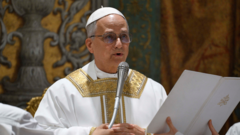In his first Mass, Pope Leo XIV vows to prioritize ordinary people and calls for greater outreach to foster faith among Catholics.
**Pope Leo XIV's First Mass: A Call for Unity and Missionary Outreach**

**Pope Leo XIV's First Mass: A Call for Unity and Missionary Outreach**
Pope Leo XIV emphasizes support for the marginalized in his inaugural speech, seeking to bridge divides within the Church.
During his inaugural Mass at the Sistine Chapel, Pope Leo XIV, the newly elected pontiff and first American pope, highlighted the importance of reaching out to "ordinary people" and addressing the need for strong moral guidance in today's world. Echoing the legacy of his predecessor, Pope Francis, he urged the Church to engage in "missionary outreach" aimed at rekindling faith among followers.
Pope Leo XIV acknowledged the challenges faced due to a widespread erosion of religious faith, contributing to significant violations of human dignity globally. In a heartfelt homily delivered before an assembly of cardinals, he emphasized the necessity for the Church to stand firm against inequalities and support those marginalized, laying the groundwork for his papacy focused on compassion and justice.
Born Robert Francis Prevost in Chicago, Pope Leo XIV has a unique background enriched by decades of service in Peru, where he became deeply rooted in the local communities. His first words as pope underscored a commitment to inclusive dialogue, which he hopes will bridge existing divides between progressive and conservative factions within the Church.
As his leadership begins, he faces critical decisions on various pressing issues, including women's roles, LGBTQ+ inclusion, and the ongoing accountability for clerical sexual abuse. These challenges, coupled with the need for a unifying vision, were at the forefront of discussions as cardinals welcomed their new leader.
The anticipated changes in Church governance lead to speculation about Leo XIV's approach and the potential continuity with Francis’ inclusive policies. Initial reactions suggest a sense of hopefulness among many, with observers anticipating a papacy that honors tradition while striving for necessary reforms.
Leo XIV's election is particularly significant for American Catholics, reflecting demographic shifts within the Church. Many see his election as a reaffirmation of the Catholic faith's relevance, even as certain factions within the Church grapple with differing interpretations of spirituality and morality.
In his first public address following the Mass, Leo XIV addressed the faithful from the St. Peter’s Basilica balcony, encouraging a return to foundational Christian values and initiating a call to action for all Catholics to engage actively with their communities. As the world watches, his pontificate holds promise for revitalizing faith and addressing the modern challenges facing the Church.
Pope Leo XIV acknowledged the challenges faced due to a widespread erosion of religious faith, contributing to significant violations of human dignity globally. In a heartfelt homily delivered before an assembly of cardinals, he emphasized the necessity for the Church to stand firm against inequalities and support those marginalized, laying the groundwork for his papacy focused on compassion and justice.
Born Robert Francis Prevost in Chicago, Pope Leo XIV has a unique background enriched by decades of service in Peru, where he became deeply rooted in the local communities. His first words as pope underscored a commitment to inclusive dialogue, which he hopes will bridge existing divides between progressive and conservative factions within the Church.
As his leadership begins, he faces critical decisions on various pressing issues, including women's roles, LGBTQ+ inclusion, and the ongoing accountability for clerical sexual abuse. These challenges, coupled with the need for a unifying vision, were at the forefront of discussions as cardinals welcomed their new leader.
The anticipated changes in Church governance lead to speculation about Leo XIV's approach and the potential continuity with Francis’ inclusive policies. Initial reactions suggest a sense of hopefulness among many, with observers anticipating a papacy that honors tradition while striving for necessary reforms.
Leo XIV's election is particularly significant for American Catholics, reflecting demographic shifts within the Church. Many see his election as a reaffirmation of the Catholic faith's relevance, even as certain factions within the Church grapple with differing interpretations of spirituality and morality.
In his first public address following the Mass, Leo XIV addressed the faithful from the St. Peter’s Basilica balcony, encouraging a return to foundational Christian values and initiating a call to action for all Catholics to engage actively with their communities. As the world watches, his pontificate holds promise for revitalizing faith and addressing the modern challenges facing the Church.




















